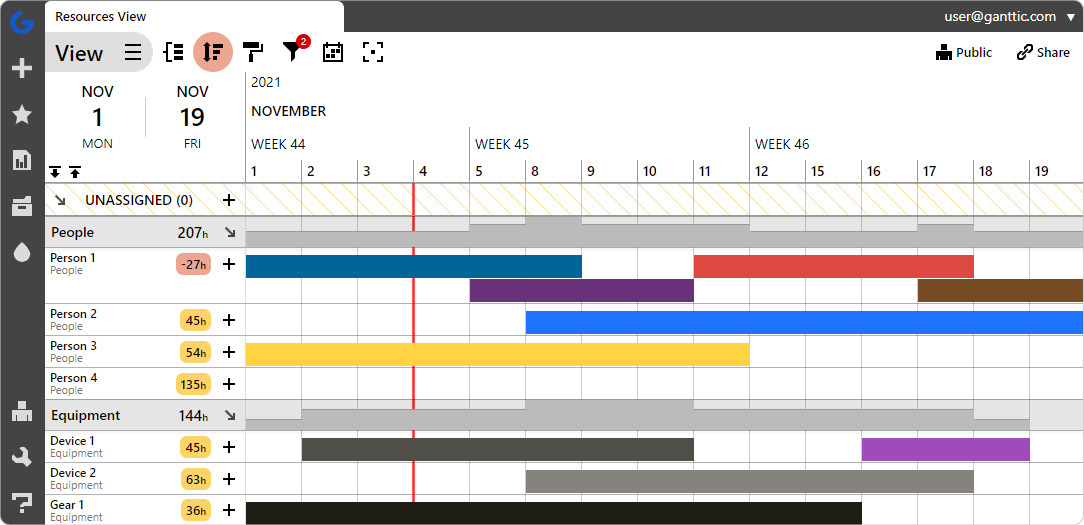Projects are how things are done these days. However, according to the latest research, there are still gaps between skills for successful project management and the education you receive from your project management framework course. The research showed that there are four main skills that the framework course usually fails to teach.
Of course this is actually logical, since many of these skills are the kind you can only develop over time with mindful approaches. Findings like this always remind you how much more than scheduling tasks, planning capacity, and reallocating resources project management is.
Here we give you an overview of the skills that you should pay attention to and some useful tips from project managers and experts that you should keep in mind.
4 Skills You Can’t Learn in a Project Management Course
1. Communication and Interpersonal Skills
Being a leader means you have to have good communication and interpersonal skills. There’s just no way around it.
You have to be able to work side by side with different people and different personalities. You have to be able to set the tone for each conversation and communicate your goals and expectations clearly. And as an extra bonus, you should know how to effectively orchestrate and receive those messages in person as well as via phone, email, social media or the team communication tool of your choice.
In project management, communication skills are often considered secondary after things like scheduling, budgeting or task management. When in reality, communication is what really sets the framework for everything else.
Advice From Project Managers for Improving Communication:

Listen to Your Team
One of the best skills for any leader is something we all learned in kindergarten. Listen to one other. Really listen.
For example, try to be present and actually listen when the other person talks. Don’t just wait for your turn to say something. As it is with any skill, you have to train to be better at listening and really put some effort in it. It might sound silly to train to listen because it’s like talking or walking or writing or…breathing.
Because think about it. If you didn’t learn how to talk, you’d still have your voice, and you could make some sort of sounds. You could move your legs even if you didn’t know how to walk. And you could hold a pen and draw random lines even if you didn’t know how to write. You get the point. Really knowing how to listen isn’t the same as hearing sounds.
According to Cherie Kerr, president of ExecuProv, a California-based communication training company, “One of the reasons for difficulty listening is because there is too much stimulation around us.” If you feel like that one is the problem for you, too, try meditation. Meditation has been shown to improve mental focus along with other benefits. Don’t miss out on it just because you have some prejudice. It as magical as they say. If you don’t know how to start, try some meditation apps to get you going.
Be Honest
Be emotionally honest, and your team will follow that lead. The relationship that you have with your project team isn’t much different from your relationship with your loved ones in that sense. Considering project management is still to a large extent male dominant and men tend to struggle with emotional honesty the most, it’s not surprising there’s a problem.
You might even think that emotions have a little to do with project management while reading this. But here’s the thing – anything that as something to do with people has something to do with emotions. I’m going to make a safe assumption here and say that your project team consists of people.
It can be easy to forget that if they are just Gantt chart lines for you in your resource planning software. Read up on emotional honesty, and you’ll see many ways you can benefit from practicing it. If you manage to create an environment that’s emotionally honest for your team, they will blossom. Working on your emotional honesty is an investment worth making both personally and professionally.
Use Leading Questions
That way you’ll get them to think what you want them to think with them thinking that it was their idea. It means that rather than asking “How long will the task take you?” You should ask “Will the task take you two weeks?” Instead of asking “Which option do you like the best?” Say “Shall we go with the second option?” Yes, it can sound kind of manipulative. Especially after all this emotional honesty talk.
But it’s one tool that you can use to guide your team on the road you have set your mind on. If your team believes that whatever they are doing is right and not just what they’ll have to do, they’ll do it with higher commitment and thoroughness. As a bonus, asking leading questions helps you to keep the focus of the conversation the goals you have set and it’s much more difficult to get sidetracked.
2. Change Management and Risk Management
Change management isn’t really something that a single blog post can cover let alone only a paragraph of it. I’m not going to try to do that. I’m just reminding you that it’s something you need to learn to really get it right, and your project management framework course probably won’t help you there.
Change management is the watchdog that makes sure that changes are thoroughly and smoothly implemented. One of the most important things about changes management is identifying everyone that’s going to be affected and how exactly are they going to be affected. It’s a top to bottom process meaning that the change you are trying to implement must be accepted and embraced by the executive level of your organization.
Advice From Project Managers for Improving Change Management

Develop a Clear Chain of Command
The communication regarding the change should always be clear and consistent. That’s why you need the executive team on board. You must also remember that although it comes naturally to a human being to resist change, we are quite resilient to it. If a change is worth making, don’t be afraid of it. Also, don’t get caught in planning the process without considering the people involved.
Plus a clear chain of command ensures that if mistakes happen along the way, that your team knows who to turn to in order to correct the course of action. Tasks and questions aren’t abandoned half way through, and projects don’t merely fizzle out.
Learn to Manage Risk
The National Institute of Standards and Technology risk management guide states that risk management is the process of identifying risk, assessing risk, and taking steps to reduce risk to an acceptable level. Developing a risk management strategy that works for your organization can take quite a lot effort and is something that’s not going to be covered in depth here.
Being good at risk management is something that comes with time and experience. Actually, that’s not right. Identifying risks gets easier with time and experience.
That’s why the one thing I need you to remember about risk management is that your team is your greatest asset. All of your team members have different levels of expertise that you can use to define all the possible risks. Start from getting them into one room and just brainstorm all the different risks your project might face.
Whether you are just starting out or an experienced project manager, advice and different perspectives on the subject can never hurt you.
3. Problem Solving Skills and Flexibility
There are many ways to solve each and every one of the problems that you face on a daily basis. As a project manager, you have to be able to solve problems like a project that’s running behind on the project schedule, your team losing personnel, general resource deprivation etc.
It’s likely that your project management course taught you about different methodologies, but applying those methods to real life is a different skill entirely. does not teach is how to actually find the best possible option. So, what can you do to be a better problem solver?
Advice From Project Managers for Improving Problem Solving:

Train Your Analytical and Critical Thinking
Your brain is a muscle. Actually, your brain is not a muscle. It’s actually an organ of soft nervous tissue contained in the skull of vertebrates, functioning as the coordinating center of sensation and intellectual and nervous activity. So it’s much more complex. But like a muscle, your brain can be trained.
And training your analytical and critical thinking skills will make you better at solving problems. While critical thinking takes facts and forms them into opinions, analytical thinking divides problems into tinier bits and takes facts and shapes conclusions.
Both are equally important. You can train your analytical thinking skills with constant tiny exercises like trying to see the things from the perspectives of the antagonists while reading a book or trying to remember everything around you while taking a walk and documenting it later. Or solving algebra problems or sudokus. Basically, anything that challenges your brain.
Training your critical thinking skills is more about being able to question authority and facts, change perspectives, and understand your own biases. It’s about asking questions until you have enough information. It’s about evaluating the answers you get. It’s about not rushing in. It’s about really being present while making a decision, being conscious about your decision-making process.
Do Some Mental Yoga
Yup, in the title, there’s “flexibility” and I have not touched the subject yet. Here’s where I’ll do it. Although actual yoga has many mental health benefits, it’s not what I mean here. I’m talking about the yoga that’s going to make you mentally flexible.
Why is it good to be mentally flexible? Well, if you are not mentally rigid, you are able to see things from different perspectives, solve problems in creative ways and understand where other people are coming from. As you can probably understand, being mentally flexible is a part of critical thinking. But it’s something that’s worth mentioning separately since mastering it will make you enjoy life more in general. It’ll make you more calm and understanding.
So, the next time you’ll find yourself in the midst of an argument, make it as multi dimensional as life. You know there isn’t just one right and wrong. Try to find arguments why your opponent is right. Attempt to find arguments why you are wrong. Try to bring in more perspectives. Debate an issue even if the decision seems to be unanimous. Fight the urge to be the one that is right. Fewer warrior poses and more bridge poses. Because, you know, you can use bridges to get from one point to the other and stuff. Force yourself to do this continuously and you’ll see a difference in how you make decisions regarding scheduling resources, managing projects, and leading your team.
4. Monitoring and Controlling
Monitoring and controlling is the what you do to make sure that your projects run smoothly. Not only so that they get done on time, but also within budget. Somehow your project management framework course still missed it. The key tasks that you should be doing to monitor and control your projects are scope verification and change control, schedule control, cost control, quality Control, performance reporting, risk control, contract administration, complete monitoring and controlling phase review.
That’s a whole lot of control. So where do you begin?
Advice From Project Managers for Improving:
Develop and Track KPIs
Depending on who you ask, planning metrics and KPIs are either a godsend or a punishment for our sins on earth. And while it’s never great to rely solely on numbers to tell you if projects are going OK, they can give you insight for improvement. And tell you exactly where some of the problems lie.
For example, you can measure project progress against project plan and make changes if what it is isn’t what you planned. This is where your problem-solving skills kick in and you can start implementing your change management process. But since everything is documented and the process is outlined, it’s not merely throwing darts at a board.
Keep Meetings Short and Sweet
Even if you are using project portfolio management software to keep an eye on everything that’s going on, schedule short meetings during which your team can report all of their struggles and triumphs. I have covered the art of meetings before, and I stand my ground that you really should have meetings that are short.
If you set your goal to identify the issues and not solve them then and there, the meeting can be done in under 20 minutes. The issues you have found should be solved at a separate meeting with appropriate people. That way you won’t waste anyone’s time, and all the issues get an equal amount of attention.
Ganttic Helps You Become a Better Project Manager

There’s something that only experience can help with. Some of these skills cannot be learned in a project management course, and the only way to learn is by diving in. But that doesn’t mean you have to be unprepared.
Ganttic is project resource management software that can help bolster these skills while you’re still learning. Or even if you already know what to do. A crystal clear picture of your project schedule and team’s work assignments. With a visual Gantt chart planner, that can be used by the whole team (for free!) that does the communication for you.
With Ganttic you can develop and track KPIs, a way to compare reality with plans. And a clear measurement of how effective your own project management prowess is. Keep your team up to date with changes to the project plan. Or schedule meetings and other time off with a clear plan of action if others need to take over.
Resource planning is crucial to an accurate project time frame and helps you put the focus back on your team. Ensuring that no one is overworking to the point of burnout. And cutting out unnecessary stress in the meantime.
Contact us for a demo or try Ganttic for free. And up your project management game.